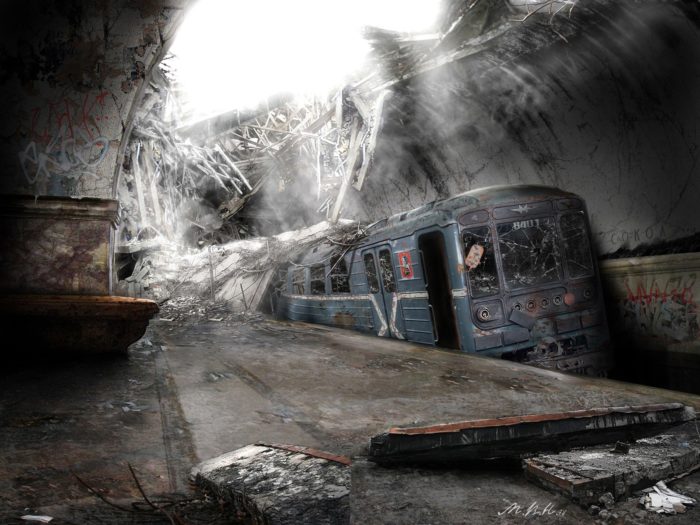
As America has settled into a new normal of COVID-19 pandemic, race riots, and new civil war levels of violence, Walmart — as America’s most popular store — has reacted by first mandating masks and now, requiring shotguns as well.
3 Comments
As America has settled into a new normal of COVID-19 pandemic, race riots, and new civil war levels of violence, Walmart — as America’s most popular store — has reacted by first mandating masks and now, requiring shotguns as well.
3 Comments 
I found it hilarious to see the book sales of George Orwell’s 1984 skyrocket just after the election of President Donald Trump. (more…)
6 CommentsTags: censorship, Death Metal Underground under siege, decline and fall of western civilization, dystopia, end times prophecy, Fahrenheit 451, h.p. lovecraft, historical revisionism, Ray Bradburry

The pigeon decided to return. Had it not, the retro-Powermetalers would have maimed him fatally, with buckshot fire. Despite his cute appearance with those tiny post apocalyptic goggles of his, he would have then been eaten slowly by cockroaches over time after falling from grace. Before he returned to Daryl he grabbed a 5 Bolivar silver coin from what was left of Panama. It was hard to fly back over the 500 foot wall that Trump had built, back in the technology age. Not only did it have retracting metal spikes on top, but there was a moat with alligators on both sides. Dead bodies were strewn along both sides of the fence, with vital organs missing. No one ever came in. No one got out alive either. Fortunately for Latin America, the wall mitigated the radiation winds on that side.
Upon the bird’s return, Daryl noticed the silver Panamanian coin in his beak. It was a very low mintage coin and he was thrilled of the indication that there was power still now in that region of the world.
1 CommentTags: 2159, dystopia, fiction, future, Story, Underground Record Labels in 2159, walkman diaries

Metal journalists are yet again falling into to the trap that of believing that the differences in their political opinions and those of the bands they cover are somehow a valid criterion for judging the overall merit of the music they’re listening to. It happens every day when a prospective metalhead first learns about Burzum, and it more recently has permeated how we interact with the horde of propaganda bands out there who never let a good song get in the way of a good slogan. Megadeth’s latest full-length (Dystopia) wasn’t quite that heavy handed as a mouthpiece for Dave Mustaine’s politics (and indeed, I found it to be a banal and sterile experience compared to the band’s more ambitious early work on its musical elements alone), but it expresses enough of an opinion through its lyrics that it stung a few dissenters.
Illustrating this neurosis today are two reviews of Megadeth’s latest that are more concerned with David Mustaine’s politics than his musical efforts. First, a writer for the AV Club had to stress that even though they enjoyed the music, they were also certain that “…there’s simply no room in our already fear-laden culture for any more xenophobia”. Another review hosted on Cisternyard Media is more critical of the music, but is otherwise similar in its condemnation. Interestingly, they explicitly mention a similar level of political fervor in Megadeth’s earlier works, which doesn’t exactly attract their vitriol, and therefore helps to illustrate the writers’ specific beef with their positions.
These reviewers’ criticisms read like a poorly written tutorial on how to be the perfect social justice warrior, railing against the injustices that are clearly inherent in Dystopia‘s lyrics that therefore requiring immediate shaming and censorship, and then making lasting friends with other like-minded people in the process. The other major problem with these reviews is that they discuss the actual sound and execution of the music in an exceedingly shallow manner at best, instead choosing to be seduced by Megadeth’s technical wizardry. Given that they’ve already rejected Dystopia for not being politically kosher, I’m not expecting them to attempt more advanced topics, such as “Does Dystopia‘s songwriting effectively complement the themes Dave Mustaine is trying to convey?”, but that is a venial sin at best, given that your average metal critic cares little for musical analysis. If they continue to pursue their political vendettas, though, the odds of them writing anything significant on these subjects is nil.
28 CommentsTags: dystopia, megadeth, metalgate, political correctness, politics, social justice warriors

Megadeth has cycled between obvious mainstream rock pandering and careful imitation of their best appreciated works at an ever accelerating rate since their reformation in 2004. If this trend keeps up, they’ll be changing styles with every strum of their guitars in a few years. Dystopia isn’t quite as quick to alter its own sounds as that rather implausible hypothetical peak, but it’s still obviously colored by two colliding trends; Dave Mustaine’s desire to outsell Metallica, and the fact that even relatively extreme metal can sell enormous volumes in 2016. This makes what would be yet another comeback album into a surprisingly disjointed experience at times.
In general, Dystopia provides its potential listeners with several varieties of vintage Megadeth to peruse at their leisure, ranging from the technical wizardry of the ’80s and Rust in Peace (arguably the musical peak of this band) to the streamlined pop metal that immediately followed such, and even hints of recent albums through conceptual and musical continuity. Beyond the vocals of Dave Mustaine and the frequent guitar leads, though, there’s little that distinguishes this from other poppy speed metal of the mid 2010s, especially since this is one of those dime-a-dozen studio perfect recordings with perfectly appropriate production and instrumentation. One definite problem, however is that Dave Mustaine’s vocal and lyrical contributions have decayed in quality in recent years. Megadeth’s always been political at the best of times, but more often than not the lyrics devolve into political sloganeering that might be appropriate if he actually ran for president of the USA. In song format, though, all they do is annoy, irritate, and pander. Mustaine also relies increasingly on digital processing to mask the age-related decay of his voice, most notably on “Fatal Illusion“. This isn’t an innately bad thing, and you could theoretically make a case for the chorusing and harmonies opening new ideas for Megadeth to explore, but it pushes unneeded emphasis on the vocals, so even the average listener that decides that the technique sounds kind of cool might find it grating regardless. Perhaps I shouldn’t be focusing on the vox too much, but when the rest of the album is competent and yet unremarkable, it’s sometimes the only option.
In short, Dystopia is kind of disposable; most metal albums that try to approximate known classics are. It’s still better than Repentless, but the “Big Four” have all since run out of momentum, which makes Dystopia‘s slick technical competence marred by excessive streamlining even more unremarkable than it would otherwise be. The last time Megadeth tried their hands at this, they cranked out Endgame, which was well received at the time of its release and generally similar in approach, but has since faded from the public eye. Do you still have space in your listening rotation for Endgame? If you don’t, you won’t have time for Dystopia either.
17 CommentsTags: 2016, dystopia, mainstream metal, megadeth, modern metal, Speed Metal, traditional heavy metal, vocal driven
I mentioned Megadeth’s upcoming studio album a while back, and Dystopia is still on track to be released some time in 2016. The buildup continues, as Megadeth just released a music video for “The Threat Is Real”, a single that they admittedly pushed out about a month ago. This track reinforces my hypothesis that the upcoming album will be an “adequate facsimile” of previous Megadeth; it’s certainly appropriate given the band’s legacy, although the band would have to bust their collective asses (and brains) to displace their older works from your mind for more than a few months. The actual visual content of the video could be interesting as well, at least if you’re not put off by the odd style of animation employed.
1 CommentTags: 2016, dystopia, mainstream metal, megadeth, music video, Speed Metal, traditional heavy metal

In their glory days, Megadeth was always commercially #2 to Metallica – more technically proficient by far, structurally simpler, and literally #2 on the American Billboard 200 when they made their own dumbed down Black Album equivalent in Countdown to Extinction. Post-reformation Megadeth has been somewhat inconsistent about what part of their career they want to evoke, but if “Fatal Illusion” is any indication, Dystopia may very well be full of ’80s self-worship. There are some new aesthetic tweaks, like heavily processed, harmonized vocals from Dave Mustaine, but the overall structure of the song is an adequate facsimile of previous Megadeth and ’80s speed metal for commercial purposes. The current lineup of Megadeth notably features Kiko Loureiro (of Angra) and Chris Adler (from Lamb of God) in addition to its two founding Daves (Mustaine and Ellefson), although this track in isolation doesn’t really offer enough information on what their contributions to the band will sound like.
25 Comments
Tags: 2016, dystopia, mainstream metal, megadeth, promotional video, Speed Metal, upcoming releases
Some say the role of art is to show us what is in the future by amplifying what we refuse to notice about the present. Idiocracy takes on this task by showing us what happens to a egalitarian, sex-obsessed, entertainment-besotted and distraction-oriented culture over five centuries.
Set in 2505, Idiocracy follows the story of two people chosen for a crionics experiment because they are average in intelligence, physical ability and motivation. Absolutely expendable in the present time, they spend a half-millennium in cryostasis and emerge into a changed world.
Following the long tradition of hyperbolic absurdist comedy, Idiocracy portrays the world in broad brush strokes and basic colors. It does this because if it got any subtler, we would recognize America 2015 A.D. in this mess. In the future, the Dunning-Kruger effect — by which the stupid are arrogantly confident and the intelligent timorously hesitant — leads to a population of morons.
In the future world, society is ruled by entertainment of the most Beavis and Butthead variety, constant sexual and masturbatory stimulus, and the type of consumer hell that was imagined by 1980s thrash bands. People are not only brick stupid, but hopelessly vapid, living in a constant flood of distractions while their world crumbles around them. Idiocracy amplifies present problems to their maximum: pollution, corruption, incompetence and apathy have become not just commonplace, but dominant.
The film shadows past stories on this topic, notably Brave New World. In that novel, eugenics — the science of managing the intelligence of offspring — was controlled by government to produce leaders, artisans and drones. In the idiocratic world all eugenics has been abandoned and people survive through the buildup of technology which manages the world for them, having grown too stupid to do more than press buttons. As in Demolition Man, which alludes to the Huxley book, future authorities depend on maintaining the appearance of order through the absence of conflict. Citizens are threatened by insane police, bribed with sex and money, and kept distracted by Roman empire style circuses with a technological edge.
What this film does well is to show us a vision of hell. It keeps this vision on the line between what we recognize and what we can imagine, but the allusions to our present world are too close to be ignored. The future culture represents a cross between pro-wrestling, redneck culture, barrio living and urban lifestyles. Consistently the lowest common denominator is revealed in everything. The future population seems to be mostly Hispanic and white, with relatively few African-Americans but a health number of people of indeterminate mixed origins. This fits the theme of this movie, which is taking America A.D. 2005 and exaggerating it to reveal the natural end result of the path it is on.
In the intervening decade, the gap between reality and Idiocracy has narrowed to an alarming degree. What cannot be denied is that the future, like the present, is insufferable. People are fools, but if anyone smarter than they are arrives, they call him an idiot and metaphorically crucify him for their own entertainment. Arguing with them is like talking to people on the internet who cite Wikipedia and big media articles, but do not understand them, creating a kind of circular debate where the only people who understand it are in the minority and as a result are ignored. People lack awareness of anything more than their immediate needs in their immediate future, and have not only a lack of empathy but something worse than apathy, which is total obliviousness toward all consequences which cannot be immediately visualized. In Idiocracy, ignorance wins out over knowledge and intelligence every time, and the only way to get anything done is to lie to people and play to their superstitions and ignorance. It is a cynical and yet strikingly accurate view of the future.
Where this movie becomes difficult is that it is a cross between political polemic and cartoon, although it is not animated. There is no subtlety, no depth of character other than vague goodwill, and every scene exists to prove a point on the outline of an essay which might be titled Too Much of a Good Thing: How Humanity Won All Challenges and Atrophied Into Mental Retardation. The underlying pro-eugenics theme does not focus, as most of them do or movies such as Gattaca flirt with, on the production of superior beings so much as on the proliferation of average ones, and how that in turn induces average to consistently lower itself to avoid excluding anyone. The most crushing scene occurs when lead character Joe Bauers attempts to explain simple reality to a group of future-idiots, and is mocked for his trouble by those who rely on supposed “superior” knowledge.
I doubt this movie will find any fans in our established elites, for whom the idiots of this hypothetical — and it is best to put a big fat question mark next to that word — future seem like ideal constituents. Nor will it find many political supporters, since it avoids taking a side and instead points numbly and ardently at the elephant in the room. It is however most effective as a type of conditioning, in that after watching this movie the traits of people around in stand revealed in their full selfishness/narcissism, denial and manipulative distraction. For that reason, it fits within the metal worldview of seeing our society as a hugbox of denial of its own decline, and the rot coming from within and being masked by — not helped by — the rhetoric of peace, love, equality, subsidy and happiness which is the opiate of our fellow citizens as they zone out and wait to become idiots of the future.
http://www.youtube.com/watch?v=icmRCixQrx8
9 CommentsTags: brave new world, dystopia, dystopian film, eugenics, genetics, horror film, idiocracy, joe bauers, science fiction
Cult movies must take on an attitude similar to heavy metal and horror films: as outsiders looking in at a society whose institutions and ideals are entirely corrupted by what humans wish were true, and populated by humans who refuse to see the obvious because of their socially-defined rules and ideals which deny reality. Every good horror film involves people fighting an evil or mortal threat, but first they must fight themselves and purge from within the assumptions that make them useless, then get their war faces on and conquer the enemy or perish.
In that respect, Demolition Man is more like sci-fi horror cloaked beneath an action film. The plot is simple: ballbusting cop John “Demolition Man” Spartan (Sylvester Stallone) is convicted of mass murder for an arrest gone awry and imprisoned in a cryostasis facility. Forty years later, the vile criminal Simon Phoenix — portrayed with humor and energy by the engaging Wesley Snipes — is thawed by what looks like a computer error. Phoenix emerges into a new world: under a utopian system of government, people have become equal parts politically correct and 1980s “have a nice day” posi-culture, rendering them utterly useless against any real threat. The criminal rages across the land and in helpless confusion, the neutered future denizens thaw Spartan and send him out to get the bad guy in a decision summarized as “it takes a maniac to catch a maniac.” The movie follows Spartan as he tries to both capture Phoenix and deal with the shadowy forces that threaten revolution in this future paradise that may not be as paradisic as it claims to be. Aiding him is officer Lenina Huxley (Sandra Bullock) who although she accepts her future world as perfect, also grates against its insipid pacifism and the boredom created by its regimentation of all activity into simple steps with almost no consequences.
The underlying influence on this movie is Brave New World, alluded to not only by the use of both Vladimir Lenin and Brave New World author Aldous Huxley to construct the name of the heroine, but also revealed in the type of hell into which Spartan falls: a society dedicated to avoiding conflict and maintaining safety that has eliminated all risk, adventure, masculinity and fun. Demolition Man shows us the horror of a society that we design based on our fears. This future world has no purpose except the negative purpose of avoiding bad vibes, risk and conflict. As officer Huxley discovers, this makes for not only a boring society, but a docile one which is manipulated by leaders who are not corrupt in the ordinary sense of accepting bribes, but in a moral and spiritual sense in that they wish to stamp out all defects and create a kind of varied uniformity that resembles the hipster scene in AD 2015. John Spartan, like heavy metal, represents the primal id of humanity which desires intense experience more than it wants safety like the neurotic ego. Simon Phoenix represents the lurking psychic shadow of such a civilization, motivated only to destroy because he rightfully detests the precious snowflake-world he finds himself in, and also because as someone entirely devoid of soul his only pleasures are found through dominating others. His addiction to victimization of others makes him a menace in any age, but the future world is entirely unprepared to deal with him because it has made is own emptiness a positive value. This conflict plays out throughout the film as Spartan finds himself caught between docile social engineers and anarchic revolutionaries.
Naturally with Stallone in this movie it requires high levels of carefully choreographed violence, but these are brainier — taking advantage of the anticipated “cult” audience — than those in big blockbusters like The Expendables which converge on the moronic. Bullock, known best for romantic comedy roles, performs convincingly as a character who is blithely indoctrinated in her new world order on the surface, but covertly hoping for something of significance to distinguish her days from one another. In particular, her comedic timing is exceptional. Stallone also reveals why action films favor him through his ability to deliver absurd lines which are both masochistic-masculinist and cryptically insightful. As the film progresses, these characters converge on a middle ground and understand each other, which brings out one of the themes of the movie: while designing utopia is a terrible idea, the anarchic void also threatens, and people are desperate for a middle zone where they are both not living in fear of random violence and also not managed like slaughterhouse animals.
Demolition Man deserves every bit of its cult movie credential. Some of these scenes are painful to watch because of the high ingenue factor of people in the future, but like other movies in this vein such as Idiocracy, the pain is necessary to reveal the full absurdity of the type of goal that our politicians, entertainers and corporate overlords routinely announce as desirable. Although this movie is hammy, it is not ham-handed in that a viewer can appreciate it as a simple story without worrying about its implications, but that layer of interpretation lurks beneath the surface and brings out an emotional depth that action films normally do not have. In this satirical treatment the crisis of humanity’s attempt to manage itself becomes painfully clear, and while these characters represent broad positions in that battle, these roles occur within the spectrum of this question and allow the allegory to work without being reduced to the level of pure personal drama. Movies such as this make us fear our wishful thinking and realize that perhaps our best intentions — with which the road to hell is paved as folklore informs us — will create a prison for our souls that only raw animal violence and blind will to crush what is empty can resolve.
9 CommentsTags: action films, aldous huxley, brave new world, demolition man, dystopia, sandra bullock, sylvester stallone, utopia, wesley snipes